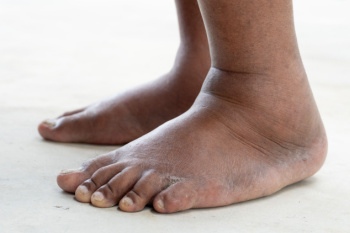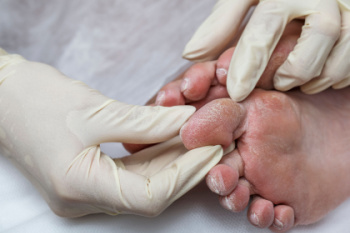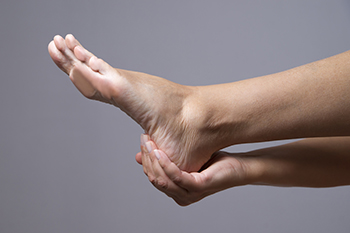 Swelling in the feet, otherwise known as edema, has a range of mild to severe causes. Mild edema may result from standing or sitting for long periods, especially in hot weather. This causes fluid to pool in the lower extremities. Swelling can also be a side effect of certain medications, hormonal changes, or dietary factors like excessive salt intake. In more severe cases, edema may be a sign of underlying medical conditions, such as heart failure, kidney disease, or venous insufficiency. In these cases, the body’s fluid balance is off, leading to fluid retention and swelling in the feet and ankles. Certain injuries, infections, or blood clots in the legs can also cause localized edema. Podiatrists, or foot doctors, can diagnose the underlying cause of foot swelling. They may recommend lifestyle modifications, compression therapy, medication management, or other treatments to address the cause. If you have swelling in the feet or ankles, it is suggested that you make an appointment with a podiatrist to find relief.
Swelling in the feet, otherwise known as edema, has a range of mild to severe causes. Mild edema may result from standing or sitting for long periods, especially in hot weather. This causes fluid to pool in the lower extremities. Swelling can also be a side effect of certain medications, hormonal changes, or dietary factors like excessive salt intake. In more severe cases, edema may be a sign of underlying medical conditions, such as heart failure, kidney disease, or venous insufficiency. In these cases, the body’s fluid balance is off, leading to fluid retention and swelling in the feet and ankles. Certain injuries, infections, or blood clots in the legs can also cause localized edema. Podiatrists, or foot doctors, can diagnose the underlying cause of foot swelling. They may recommend lifestyle modifications, compression therapy, medication management, or other treatments to address the cause. If you have swelling in the feet or ankles, it is suggested that you make an appointment with a podiatrist to find relief.
Swollen feet can be a sign of an underlying condition. If you have any concerns, contact one of our podiatrists of Montgomery Foot Care Specialists. our doctors can provide the care you need to keep you pain-free and on your feet.
Swollen feet are a common ailment among pregnant women and people who stand or sit for extended periods. Aging may increase the possibility of swollen feet and patients who are obese often notice when their feet are swelling too. There may be medical reasons why swollen feet occur:
- Phlebitis - A condition that causes the veins to become inflamed and can also cause leg pain.
- Liver disease - This may lead to low blood levels of albumin which is a protein. This can cause fluid in the blood to pass into the tissues and several areas of the body can become swollen.
- Heart failure - When the heart doesn’t pump properly the blood that is normally pumped back to the heart can pool in the veins of the legs causing swollen feet.
- Kidney disease - One of the main functions of the kidneys is releasing excess fluid in the body. This type of condition can make it difficult for the kidneys to function properly, and as a result the feet may become swollen.
- Deep-vein thrombosis (DVT)- This is a serious condition where blood clots form in the veins of the legs. They can block the return of blood from the legs to the heart which may cause the feet to swell. It is important to be treated by a podiatrist if this condition is present.
Swollen feet can also be caused by bone and tendon conditions, including fractures, arthritis, and tendinitis. Additionally, there may be skin and toenail conditions and an infection may cause the feet to swell. Patients who take medicine to treat high blood pressure may be prone to getting swollen feet.
Many patients elevate their feet to help relieve the swelling and this is generally a temporary remedy. When a podiatrist is consulted the reason behind the swelling can be uncovered and subsequently treated.
If you have any questions please feel free to contact our office located in Montgomery, AL . We offer the newest diagnostic tools and technology to treat your foot and ankle needs.

Custom orthotics can be used to relieve foot pain and discomfort. They're also used to treat various foot conditions and deformities. Flat feet, bunions, and Morton's neuroma are just a few of the foot conditions that have been known to benefit from the use of orthotics.
Comfy feet are happy feet! Contact us today.

Diabetic patients require special attention to foot health due to their increased risk of developing complications such as neuropathy, poor circulation, and foot ulcers. Neglecting foot care can lead to serious consequences like infections, foot deformities, and even amputation. To maintain optimal foot health, people who are diabetic should adhere to a few simple tips. First, inspect the feet daily for cuts, sores, or blisters, as early detection is crucial. Second, wash and dry the feet thoroughly, paying attention to the spaces between the toes. Moisturize regularly, but avoid applying lotion between toes to prevent fungal infections. Additionally, wear comfortable, well-fitting shoes and never walk barefoot, even indoors. Regular exercise improves circulation, benefiting foot health. Most importantly, if you have diabetes, it is strongly suggested that you schedule regular check-ups with a podiatrist who can monitor foot health and promptly address any concerns.
Diabetic foot care is important in preventing foot ailments such as ulcers. If you are suffering from diabetes or have any other concerns about your feet, contact one of our podiatrists from Montgomery Foot Care Specialists. our doctors can provide the care you need to keep you pain-free and on your feet.
Diabetic Foot Care
Diabetes affects millions of people every year. The condition can damage blood vessels in many parts of the body, especially the feet. Because of this, taking care of your feet is essential if you have diabetes, and having a podiatrist help monitor your foot health is highly recommended.
The Importance of Caring for Your Feet
- Routinely inspect your feet for bruises or sores.
- Wear socks that fit your feet comfortably.
- Wear comfortable shoes that provide adequate support.
Patients with diabetes should have their doctor monitor their blood levels, as blood sugar levels play such a huge role in diabetic care. Monitoring these levels on a regular basis is highly advised.
It is always best to inform your healthcare professional of any concerns you may have regarding your feet, especially for diabetic patients. Early treatment and routine foot examinations are keys to maintaining proper health, especially because severe complications can arise if proper treatment is not applied.
If you have any questions please feel free to contact our office located in Montgomery, AL . We offer the newest diagnostic and treatment technologies for all your foot and ankle needs.
 Plantar fibroma is a condition where a benign lump forms within the plantar fascia, the band of tissue that runs along the bottom of the foot. This lump is made up of connective tissue and is usually located in the arch of the foot. It can cause discomfort or pain as pressure is applied to the area, especially when standing or walking. Diagnosing a plantar fibroma typically involves a physical examination from a podiatrist, or foot doctor. The podiatrist may feel the lump in the foot's arch and might confirm the diagnosis through imaging tests, such as ultrasound or MRI. These tests help to visualize the fibroma's size and exact location within the plantar fascia to ensure it is not something else. Early diagnosis and treatment are important to manage symptoms and prevent the fibroma from worsening. If you have a lump in the arch of the foot, it is suggested that you promptly schedule an appointment with a podiatrist for diagnosis.
Plantar fibroma is a condition where a benign lump forms within the plantar fascia, the band of tissue that runs along the bottom of the foot. This lump is made up of connective tissue and is usually located in the arch of the foot. It can cause discomfort or pain as pressure is applied to the area, especially when standing or walking. Diagnosing a plantar fibroma typically involves a physical examination from a podiatrist, or foot doctor. The podiatrist may feel the lump in the foot's arch and might confirm the diagnosis through imaging tests, such as ultrasound or MRI. These tests help to visualize the fibroma's size and exact location within the plantar fascia to ensure it is not something else. Early diagnosis and treatment are important to manage symptoms and prevent the fibroma from worsening. If you have a lump in the arch of the foot, it is suggested that you promptly schedule an appointment with a podiatrist for diagnosis.
A plantar fibroma may disrupt your daily activities. If you have any concerns, contact one of our podiatrists of Montgomery Foot Care Specialists. our doctors can provide the care you need to keep you pain-free and on your feet.
Plantar Fibroma
A plantar fibroma is a fibrous knot in the arch of the foot. It is embedded in the plantar fascia which is a band of tissue that extends from the heel to the toes along the bottom of the foot. There can be multiple plantar fibromas in the feet at the same time. There are no known causes for this condition. If you have a plantar fibroma, there will be a bump in the arch of your foot that cannot be missed. Any associated pain is most often due to a shoe rubbing against the nodule. Non-surgical options, such as steroid injections, physical therapy, and orthotics should be tried first. Surgery is a last resort and is the only thing that will remove a plantar fibroma entirely. Consult with a podiatrist for a proper diagnosis and to determine the treatment regimen that is right for you.
What Causes a Plantar Fibroma?
While there are no specific causes identified, a plantar fibroma can possibly come from genetic predisposition or the formation of scar tissue that forms from healing the tears in the plantar fascia.
What Are the Symptoms of a Plantar Fibroma?
There will be a noticeable lump in the arch of the foot that may or may not cause pain. If pain is felt, it is typically because a shoe is rubbing up against the lump or when walking or standing barefoot.
Treatment and Prevention
A plantar fibroma will not disappear without treatment, but it can get smaller and be a non-issue. If pain persists, a podiatrist examines the foot and when the arch of the foot is pressed, pain can be felt down to the toes. An MRI or biopsy might be performed to help diagnose or evaluate the plantar fibroma. The following non-surgical options are generally enough to reduce the size and pain of these nodules:
- Steroid injections
- Orthotics
- Physical therapy to help apply anti-inflammatory creams on the bump
Surgery is considered if the mass increases in size and the patient continues to feel pain after non-surgical methods are tried.
If you have any questions please feel free to contact our office located in Montgomery, AL . We offer the newest diagnostic tools and technology to treat your foot and ankle needs.
